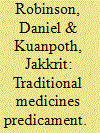|
|
|
Sort Order |
|
|
|
Items / Page
|
|
|
|
|
|
|
| Srl | Item |
| 1 |
ID:
088911


|
|
|
|
|
| Publication |
2009.
|
| Summary/Abstract |
The rising importance of Chinese herbal medicine (CHM) in alleviating human suffering has created a potential niche for East Asian countries in the profitable global pharmaceutical market. However, modern CHM that involves modern biomedical technologies presents new issues regarding the proper degree and methods of protection that apply to these products or inventions. Pharmaceutical industries most commonly seek patent protection, which offers different types of protections for different types of inventions. This article explores whether product-by-process patent claims provide proper protection to CHM product inventions and the likely implications of such an approach. It concludes that product-by-process patent claims may offer proper protection for CHM product inventions at the current status quo but might be an inadequate approach when the industry matures in the future.
|
|
|
|
|
|
|
|
|
|
|
|
|
|
|
|
| 2 |
ID:
088912


|
|
|
|
|
| Publication |
2009.
|
| Summary/Abstract |
This article considers the protection of computer software in South Africa. It deals specifically with copyright of computer programs as provided for in the Copyright Act 98 of 1978 which makes provision for the categorization of computer programs as a sui generis category of works distinct from literary works. It explores the level of copyright protection under this regime with reference to aspects like the subsistence of copyright, authorship, ownership, duration, moral rights and infringement. It also considers the effect of the sui generis categorization on compliance with the Agreement on Trade-Related Aspects of Intellectual Property Rights and the anomalies that arise in the protection of preparatory work and computer programs. The focus is primarily on South African law.
|
|
|
|
|
|
|
|
|
|
|
|
|
|
|
|
| 3 |
ID:
088913


|
|
|
|
|
| Publication |
2009.
|
| Summary/Abstract |
The current Brazilian industrial property law (Law 9279 of 14 May 1996) allows patents for pharmaceuticals, along with the Agreement on Trade Related Aspects of Intellectual Property Rights provisions. Since 1999, after an amendment in the legislation, two governmental authorities-the Instituto Nacional da Propriedade Industrial (INPI) and the Agência Nacional de Vigilância Sanitária (ANVISA)-have been concomitantly acting in the patent-granting procedures for pharmaceuticals. The INPI is the office usually responsible for the examination and granting of patents, and the ANVISA is the agency primarily responsible for the granting of marketing approval of drugs. In a peculiar situation, the two institutions have been responsible for the granting or denial of applications and have very often been divergent in their positions. The patentability of pharmaceutical inventions claiming second medical use is an example. The purpose of this work is to analyze the current situation of the Brazilian patent-granting system in the pharmaceutical field, with a special focus on the patentability of inventions claiming second medical use. It debates the two governmental positions and questions whether the existing conflicts are harmful to the system.
|
|
|
|
|
|
|
|
|
|
|
|
|
|
|
|
| 4 |
ID:
088914


|
|
|
|
|
| Publication |
2009.
|
| Summary/Abstract |
It has been constantly asserted that the intellectual property (IP) system is an effective way to enhance creativity, technological innovations, trade and competitiveness. Others, however, maintain that the IP system may not necessarily be the most effective and appropriate way to fuel the economy. This article investigates the role that IP plays in the economic development of Malaysia from 1986 to 2006. In particular, the article examines the impact of IP-based reforms, which includes not only the IP laws but other IP-related policies with a view to determine how these policies contribute to economic development in Malaysia. For this purpose, the article starts with a brief summary of important IP-related policies. Then the article proceeds with an analysis of trends in IP applications such as patent, trademark and industrial design application. Using data such as numbers of IP filing and grant, this article suggests ways in which the reforms in IP-related policies could have supported growth or could have directly influenced trends in IP application in Malaysia. The article further examines the growth of IP applications in four industrial sectors in Malaysia, i.e. automobiles, information technology, pharmaceuticals, and information and communications technology.
|
|
|
|
|
|
|
|
|
|
|
|
|
|
|
|
| 5 |
ID:
085862


|
|
|
|
|
| Publication |
2008.
|
| Summary/Abstract |
The ongoing use and protection of traditional medicines presents unique challenges for authorities, practitioners and stakeholders. With changes in the international intellectual property environment and biodiversity regulation, the Thai government has responded to ensure that traditional medicines, texts, traditional medical formulas, medicinal plants and herbs are protected through the development of a sui generis law. Drafted in 1999, the Act on Protection and Promotion of Thai Traditional Medicinal Intelligence is now being implemented in stages. Recent incidents, including controversies surrounding local and foreign patents over a Thai medicinal herb named kwao krua (Pueraria mirifica), have given impetus to traditional medicines protection, but have also tested the utility and implementation of the act by the Thai Department of Public Health. This article discusses the issues and implications in Thailand, while also reflecting on the approaches for traditional medicines protection internationally and in other countries.
|
|
|
|
|
|
|
|
|
|
|
|
|
|
|
|
|
|
|
|
|